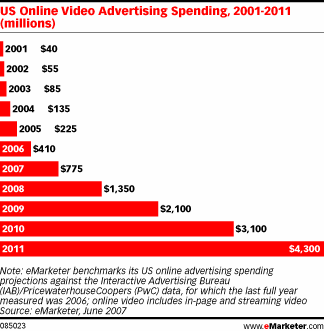Google’s foray into the online video market has been criticized by many. In fact, some believe that Google’s decision to acquire YouTube was one of the worst it has ever made, thanks to the confluence of massive copyright violations and Google’s financial backing, which gave copyright holders the impetus they needed to sue the popular site. Others believe that Google’s decision to enter the online video market and become a quasi-content firm wasn’t the best way for it to capitalize on the booming video advertising business. Either way, Google is now wholeheartedly invested in online video and YouTube is the centerpiece of its strategy.
YouTube’s Sorry Situation
YouTube may be wildly popular, but Google’s ability to realize a profit has been difficult, at best. The company spent $1.65 billion for YouTube and so far, it has yet to find a way to monetize it effectively and realize a positive return on its investment.
Estimates for how much revenues YouTube can produce are all over the place. While Forbes estimates YouTube’s revenue will reach $200 million worldwide this year and $350 million next year, Citi analyst Mark Mahaney thinks Google can make $500 million next year if it focuses more of its efforts on display ads.
But just because YouTube may be able to recognize revenue of $500 million next year, doesn’t mean it will. YouTube needs to do a much better job in the advertising department to get there. It has done little to allay many of the fears advertisers have about the content presented on the site—the limited success of its Video ID program aside. Whether YouTube, the business, can be as successful as YouTube, the video site, is still a big question mark.
For all its business challenges, YouTube remains the most popular video service on the Web. The site commands 34 percent of all Web videos streamed in the U.S. market, while the second-place service, MySpaceTV, only controls 6.4 percent, and Hulu brings up the rear with 0.7 percent (according to May, 2008 numbers from comScore Video Metrix).
Head-to-Head With Hulu
Hulu may not size up well against YouTube – in May 2008, Hulu served about 88 million videos compared to YouTube’s 4.2 billion videos – but it has the luxury of monetizing the vast majority of its videos instead of the three percent that YouTube can sell ads against. Three percent of 4.2 billion is 126 million videos a month that can carry ads—not much more than Hulu.
That pretty much levels the playing field in terms of revenue and profit potential. According to one estimate, Hulu could enjoy $90 million in revenue in its first year. And although it may not be quite as much as YouTube’s estimated worldwide revenue total of $200 million this year, it equals a Bear Stearns estimate for YouTube’s domestic 2008 revenue (of $90 million). Considering that Hulu mainly caters to an American audience, both YouTube and Hulu could see roughly the same revenues in the U.S. this year.
Unlike YouTube, Hulu isn’t plagued by copyright concerns and doesn’t need to worry about questionable user-generated content. More importantly, all of its content appeals to advertisers.
As Chris B. Allen, director of video innovation at Starcom told Forbes, “most of the momentum now is for ads within full episodes run on the TV networks’ sites, such as NBC and Fox’s Hulu, ABC.com and CBS.com. It’s a format that advertisers understand.”
But understanding the format is just a modicum of the business advantage Hulu has over YouTube. In contrast to much of YouTube’s videos, Hulu’s content doesn’t cross as many lines of decency and demographics are readily available. (Albeit, Google did launch Insight, its video statistics service, to help with demographic information).
If YouTube has shown us anything, it proves that there is a huge market for user-generated content. But from a business standpoint, professional content is the place where advertisers want to spend money and how video sites will solidify their financial position. Athough Hulu will probably never grow to the size of YouTube and Google can use that size to its advantage, Hulu’s own advantage is its ability to draw advertisers to the content that more effectively attracts their target audience.
The heart of the issue is the value of mainstream versus niche buys. Advertisers want to place ads on videos that they know their target audience is watching. YouTube has started to make a push for professional content as of late, including a deal with Family Guy creator, Seth MacFarlane. But it needs to work harder to solve the problem of making money from its costly user-generated content, which is not only the vast majority of its videos, but also the content that most advertisers don’t want any part of.
In contrast, Hulu is the epitome of a video site that has capitalized on the inertia of the industry by providing users with content they know and can enjoy, while making it a service that would appeal to practically any advertiser.
Advertisers are throwing money at Web video, but who is going to capture that growth?. According to eMarketer, online video advertising will amount to $1.35 billion this year and Google, a company that controls more than 30 percent of the U.S. video market, can only attract 15 percent of advertising spending this year. As more advertisers look to spend money on online videos and continue their search for professional content with dependable demographics data, Hulu could become the service of choice.
We can’t forget that Hulu is still in its infancy and quite a bit can happen between now and when it becomes a more powerful brand. But we also can’t forget that it’s quickly becoming the place where TV and film studios – organizations that have historically distrusted the Web – want to place content for free on the Internet. We also can’t forget that YouTube is public enemy number one for those studios because it was once (and still is, to some extent) a haven for copyright infringement.
All Google needs to do to ward off the Hulu threat is to make a little bit more of its video inventory appealing to advertisers. Not much, maybe 10 percent.
But if Google doesn’t lure more professional content as quickly as possible and do its best to monetize user-generated content, Hulu will gain ground financially and could solidify itself as a big money maker in the industry. Perhaps even bigger than YouTube. All the while, Google will keep spending millions each quarter to pay for YouTube and desperately search for business models that will one day hopefully see it turn a profit, while NBC and the rest laugh all the way to the bank.

